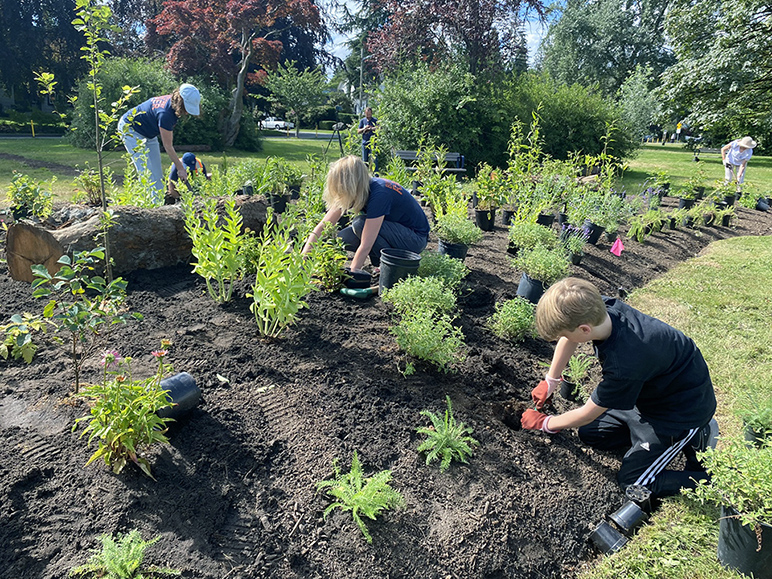We’ve got a new community pollinator garden at Grand Boulevard Park! Yesterday, volunteers from the David Suzuki Butterflyway Project and Lynn Valley Garden Club joined City staff for a community planting day. The new garden provides food, shelter and nesting habitat for bees, butterflies and other pollinators.

More Information
Learn more about the project at cnv.org/pollinators.
For any questions about the new pollinator garden in Grand Boulevard Park, please contact Engineering, Parks & Environment at eng@cnv.org.
June 21, 2022
Grand Boulevard will be soon buzzing with bees, butterflies and birds. The City of North Vancouver has partnered with the David Suzuki Butterflyway Project and members of the Lynn Valley Garden Club to build a new pollinator garden in Grand Boulevard Park to create habitat for bees, butterflies and birds.
The garden will be planted in a small section of the west side of the park between East 17th and 18th Streets. City crews will start preparing the site on June 21, and there will be minimal disruptions to the park. Volunteers with the Butterflyway Project are scheduled to plant the garden in July 2022 and will maintain it in partnership with the City.

About Pollinator Gardens
Pollinator gardens provide nourishment and shelter to pollinators including native bees, butterflies, moths and hummingbirds. In return, these beneficial creatures pollinate by moving pollen from one flower to another. Pollination is important for a strong, healthy ecosystem as over 80% of crops in the world rely on pollinators to produce food.
Creating a Pollinator-Friendly Habitat at Home
Residents can support creating pollinator habitats. What may seem like a small contribution, like planting a flower in a pot or letting a dandelion grow, can provide valuable habitat for pollinators. Here are some additional ideas to attract pollinators to your home:
- Grow a mix of plants including native species that flower throughout the year and bloom all season. Native plants often feed more pollinators than non-native plants.
- Add a water element to your garden like a bird bath with rocks for bees to rest on.
- Add bird and bee houses to keep insects and birds returning to your garden.
- Leave some natural debris like dead stems and dry leaves on the ground, especially over winter to provide shelter for overwintering insects and birds.
- Avoid lawn and garden chemicals. Pesticides and fertilizers can kill some pollinators and harm other beneficial insects.
- Reduce nighttime outdoor lighting. Many insects and birds are highly sensitive to artificial light, which can impede their navigation, reproduction and ability to find food.
- Use containers for gardening in small spaces.
About the Butterflyway Project
The David Suzuki Butterflyway Project is a citizen-led movement growing highways of habitat for bees and butterflies across Canada, one butterfly-friendly planting at a time.